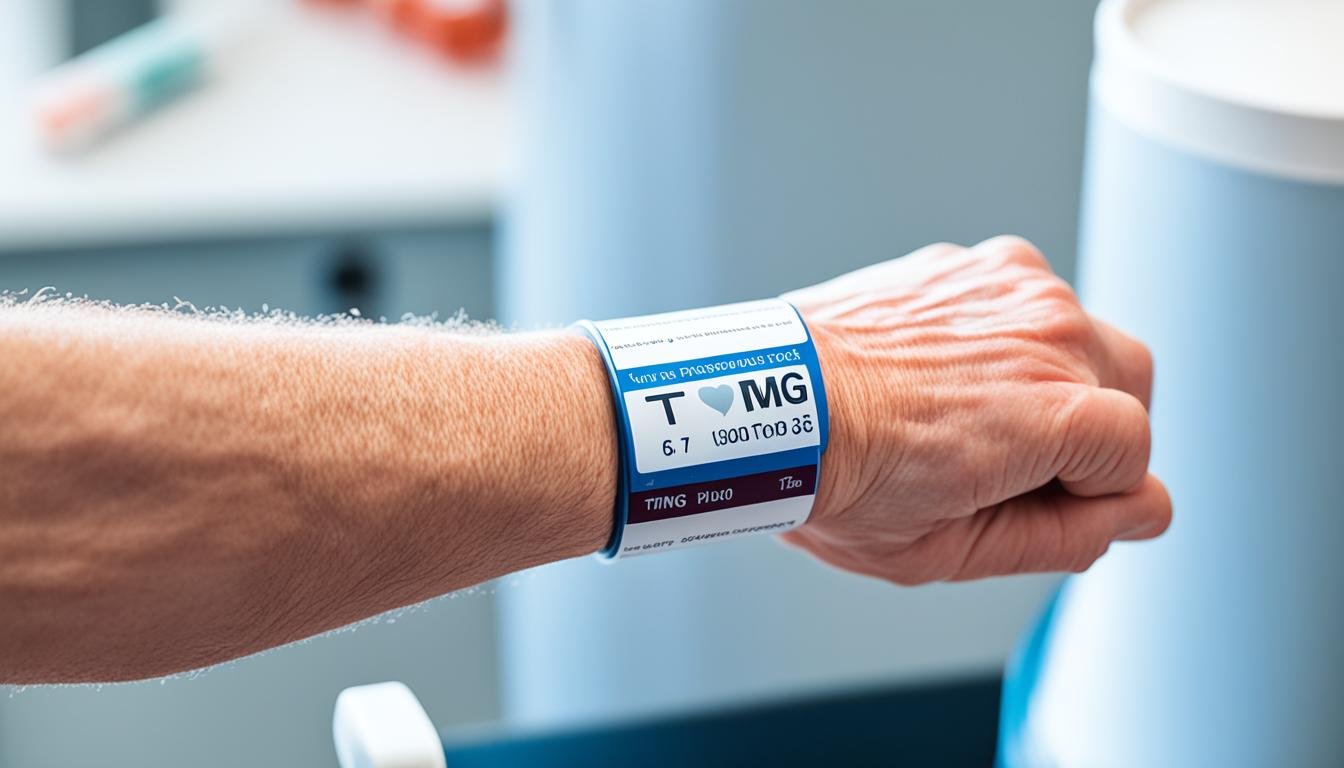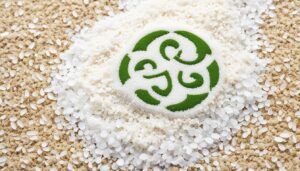If high blood pressure is a concern, you might think about using trimethylglycine (TMG). TMG is a natural compound known for its heart health benefits, like possibly lowering blood pressure.1 This guide will cover the right TMG dosages, what it can do, and how safe it is for high blood pressure.
TMG can not only benefit your heart but also help with sports performance and insulin control.1 It’s safe to take up to 15 grams of TMG a day. But, you might get an upset stomach or vomit at very high doses.1 That’s why it’s so important to talk to a doctor. They can help pick the right TMG amount just for you, based on your health.
Key Takeaways
- TMG (trimethylglycine) may help manage high blood pressure and support cardiovascular health.
- Recommended TMG dosages typically range from 500 to 9,000 mg per day, divided into smaller doses.
- TMG supplements are generally considered safe at doses up to 15 grams per day, but higher doses may lead to digestive side effects.
- TMG’s ability to lower homocysteine levels and its anti-inflammatory properties may be the primary mechanisms by which it benefits heart health.
- Combining TMG supplementation with lifestyle changes, such as dietary modifications and exercise, can provide a more comprehensive approach to managing high blood pressure.
Understanding Trimethylglycine (TMG)
Trimethylglycine (TMG), or betaine, is an important substance in your body. It offers anti-inflammatory and antioxidative benefits. You can get it from foods like beetroot. You can also take it as a supplement.1 TMG is crucial for methylation, a process key for making DNA.
What is TMG?
TMG stands for trimethylglycine. It is vital for your heart health, metabolism, and brain work. It comes from choline, an important nutrient. TMG is also known as betaine anhydrous or glycine betaine.2
Sources of TMG
You can get TMG from your diet or in supplements. Foods like wheat bran, wheat germ, spinach, and quinoa are rich in TMG.1 For instance, wheat bran has about 1,339 milligrams in every 3.5 ounces. TMG supplements are another way to increase your intake of this essential nutrient.
TMG and Cardiovascular Health
Trimethylglycine (TMG), or betaine, is gaining interest for its benefits on heart health. Studies suggest that TMG might reduce homocysteine, lowering heart disease risk.1 It does so by turning homocysteine into methionine, a heart-friendly compound.1
Lowering Homocysteine Levels
High homocysteine levels could mean a higher chance of heart issues.1 But, TMG could lower these levels safely.1 Using TMG in heart health plans could show promise.
Supporting Healthy Blood Pressure
TMG isn’t just about homocysteine; it could also help keep blood pressure in check.3 It does this by aiding in a balanced inflammatory reaction and helping with cell energy.3
Studies show TMG might really help the heart by addressing these risks.13 For anyone thinking of adding TMG to their routine, talking to a doctor first is wise. They can recommend the best way and check for any medicine interactions.
Potential Benefits of TMG
TMG does more than help your heart; it may fight inflammation too.1 An animal study in 2018 found that TMG supplements helped mice burn fat better and reduced resistance to insulin.1 This means TMG might help people be more sensitive to insulin and do better in sports by fighting tiredness, upping protein making, and making more creatine.1
Anti-Inflammatory Properties
Studying TMG shows it might keep inflammation under control by stopping certain proteins that start it.3 By doing this, TMG could help beyond the heart, offering other health boons.3
Promoting Insulin Sensitivity
In 2017, a study found that more choline and betaine in the diet were linked to less insulin resistance.1 TMG might help fight insulin resistance in liver cells. Plus, taking betaine can lower inflammation, better insulin’s job, and improve signals in the liver that keep you healthy.4 Getting better at using insulin can improve how your body handles sugar and burns energy.
Enhancing Athletic Performance
Taking TMG might make you better at sports and change your body composition.4 TMG helps your cells’ powerhouses work better, which could lead to being stronger in sports. It’s a useful addition for those who workout a lot.3
how much tmg should i take for high blood pressure
There isn’t an official TMG (trimethylglycine) dosage standard yet. Most TMG supplements contain 750 to 3,000 milligrams (mg) per dose.1 It’s safe to take TMG up to 20 grams daily.1 For humans, studies have looked at 500-9,000 mg each day. They usually split this into smaller doses.1 How much TMG you need for high blood pressure depends on your health and how you react to it.142
If you’re thinking about TMG for high blood pressure, talk to a healthcare pro. They can figure out the effective TMG dosage range for you.42
Using up to 4 grams of TMG daily might reduce homocysteine levels.1 TMG could also help keep blood pressure normal and boost heart health.42 Yet, how you react to it might differ. So, it’s key to team up with your healthcare provider. They can help find the recommended TMG dosage for hypertension that suits you.142
Remember, along with TMG, mix in other good habits like better eating and regular exercises. This combo is best for tackling high blood pressure.2
Dosage Recommendations
There are no official dosage rules for TMG supplements. Most products give 750 to 3,000 milligrams (mg) per dose.1 Using up to 20 grams (g) each day is safe.1
Studies on TMG’s benefits in humans often use 500 to 9,000 mg daily. This is taken in smaller amounts throughout the day.1
Typical Dosage Range
The usual TMG serving is a 1,000 mg capsule. Taking two capsules in the morning is recommended.3 Some may have 750 mg, while others go up to 3,000 mg. This varies by product and type.1
Factors Affecting Dosage
Your health, what meds you’re on, and how your body works can change the right TMG dose for you.1 If your genes, like MTHFR, influence this, you might need more or less TMG.1 Tests help your doctor figure out what TMG dose is best for you.
Side Effects and Precautions
TMG (trimethylglycine) supplements can help your heart. But, remember, they might have side effects.1 Taking too much TMG could cause tummy issues like diarrhea, indigestion, and bloating.1 It’s best not to overdo it with the supplement to avoid these problems.
Potential Digestive Issues
High doses of TMG might upset your stomach.1 Sometimes, TMG can raise methionine levels in your blood. This could lead to brain fluid buildup.1 To stay safe, start with a small TMG dose and increase slowly if you must.
Interactions with Medications
TMG can have issues with certain drugs for high blood pressure, diabetes, and depression.5 It’s smart to talk to a doctor before adding TMG to your routine, especially if you take meds.5 They can help you avoid bad mixtures and figure out the right TMG amount and time to take it.
Don’t give TMG to kids or pregnant/nursing folks. We need more studies to know if it’s really safe for them.1 There’s still a lot to learn about TMG’s full benefits and any issues it might cause.1
Dietary Sources of TMG
To get more TMG, or trimethylglycine, add foods rich in it to your diet. Wheat bran is a top source, with 1,339 mg in every 3.5 ounces or 100 grams. Other grains like wheat germ give less but still good amounts.
Choline in foods like eggs and soybeans helps your body make TMG. Spinach is also a great source, with 600-645 mg per 100 grams. Quinoa (390 mg), beets (114-297 mg), and shrimp (219 mg) are high in TMG. So are wheat bread (201 mg) and other foods.
1 Boiling foods rich in TMG can lower its amount. To keep TMG intake up, try steaming or roasting these foods.
TMG and Homocysteine Metabolism
TMG, or trimethylglycine, aids in methylation, crucial for DNA making.1 It changes homocysteine to methionine, a good amino acid. This is vital when B vitamin amounts are low.3 TMG might work better than folate on its own for controlling homocysteine.
The Role of B Vitamins
B vitamins, including B6, B12, and folic acid, are key in the methylation process with TMG.3 They help convert homocysteine to methionine. It shows how important it is to keep good levels of these nutrients.
TMG as a Methyl Donor
TMG donates a methyl group, changing homocysteine to methionine, less toxic.13 This keeps homocysteine levels healthy, crucial for the heart. TMG’s act as a methyl donor is vital for well-being.
| Nutrient | Functions | Dietary Sources |
|---|---|---|
| Trimethylglycine (TMG) |
|
Understanding TMG and B vitamin’s roles is crucial for heart health and well-being. It helps take a proactive stance.
Combining TMG with Lifestyle Changes
Using TMG supplements can be great for your heart, but it’s even better to mix them with healthy lifestyle changes.1 Eat more TMG-rich foods like beets and spinach to boost your heart health. Regular exercise and good stress management techniques help TMG improve your blood pressure and heart function even more.
Dietary Modifications
Adding TMG-rich foods to your meals is a vital part of taking care of your heart.1 Foods such as wheat bran, wheat germ, spinach, quinoa, and beets have a lot of TMG.1 By eating more of these foods, you improve your overall health and well-being.
Exercise and Stress Management
Pairing TMG with regular exercise and stress management techniques is key for heart health.16 TMG can make you better at sports, stronger, and more enduring. It’s perfect for anyone leading an active life. Stress management methods like meditation and deep breathing also boost the effects of TMG on your blood pressure and heart.
TMG and Other Cardiovascular Supplements
TMG works best when used with other heart health supplements.1 This includes nutrients like B vitamins, CoQ10, and omega-3. They all help keep homocysteine levels in check, lower inflammation, and boost heart health.2 This combined approach is great for managing high blood pressure and improving how your heart works.
Complementary Nutrients
B vitamins, such as folate, B6, and B12, help break down homocysteine.2 paired with TMG, they turn homocysteine into a beneficial amino acid, methionine.2 Adding CoQ10, a strong antioxidant, and omega-3 from fish oils helps too.2 They reduce inflammation and boost overall heart function when used with TMG.
Integrative Approach
Using TMG with other proven supplements can improve heart health more than TMG alone.12 This method is especially good for those with high blood pressure or at risk for heart disease.2 Keeping an eye on key blood markers, like homocysteine and cholesterol, helps adjust the supplement plan for the best results.12
Individual Variations and Monitoring
The right amount and response to TMG can differ, especially due to genetics.1 People with gene changes, like in MTHFR, may need more or less TMG.1 Testing blood regularly for details like homocysteine and cholesterol is key.1 This helps adjust TMG use to get the best heart benefits.1
Genetic Factors
Some individuals will need to change their TMG amount based on their genes.1 Knowing how your genes affect TMG’s effects can help.1 It guides you to adjust your use for the most benefit.1
Regular Blood Tests
It’s very important to check your blood regularly if you use TMG.1 This way, you can make sure TMG is helping your heart as it should.1 If needed, you can change your amount or how you use it.1
Research on TMG and Hypertension
Several studies have looked into whether TMG can help keep blood pressure at safe levels.1 They found TMG might work by reducing homocysteine and fighting inflammation. This could be good for the heart and control of blood pressure.2 But, we still need more studies to know exactly how TMG affects heart health and blood pressure.
Clinical Studies
Research shows that up to 4 grams of TMG a day can lower homocysteine without hurting the heart.1 A study in 29 soccer players even found that 2 grams of TMG daily for 14 weeks improved muscle strength, running speed, and the ability to sprint again.1 This hints that TMG might boost how well athletes perform, indirectly helping heart health too.
Mechanisms of Action
TMG might help keep blood pressure in check by lowering homocysteine and fighting inflammation.2 High homocysteine is linked to many health problems, such as memory problems, depression, and blood clots.2 TMG turning homocysteine into methionine helps offset these risks.2 Plus, TMG’s fight against inflammation might add to its heart benefits.
Even though TMG seems helpful for high blood pressure, we need more studies to figure out exactly how it works best.12 Still, TMG looks like it could be a useful, proven choice for improving heart health naturally. It might be a good addition for controlling blood pressure and overall heart health.
Choosing a Quality TMG Supplement
When picking out a TMG3 supplement, pick a well-known brand. Choose one that’s known for using top-grade, pure ingredients. It’s also crucial that they get tested by third parties to make sure they’re strong and clean.3 Make sure the product you choose is free from GMOs, and suitable for both vegetarians and vegans. It should also not contain any extra fillers, binders, or fake stuff.3
Reputable Brands
Talking to a health expert is smart when you need to find the right TMG3 supplement for you. They know which brands to trust. They can help you pick one from a brand that is well-known for doing things right. This ensures the quality and safety of the product.3
Third-Party Testing
Finding TMG3 supplements that have been third-party tested is important. This testing checks the ingredients to make sure they’re pure and strong. [third-party testing for tmg supplements, ensuring purity and potency of tmg products] You can be confident that such a supplement won’t have any harmful or unnecessary additives.
By picking a reputable TMG3 supplement brand, and one with third-party testing, you’re making a good choice. You can trust that you’re buying a product that helps support your heart and overall health. [choosing quality tmg supplements, reputable tmg supplement brands, third-party testing for tmg supplements, ensuring purity and potency of tmg products]
Conclusion
TMG is a helpful nutrient for your heart health. It can keep your blood pressure at safe levels4. This nutrient lowers homocysteine and fights inflammation. Making it a good choice for managing high blood pressure4,7.
Finding the right amount of TMG and how effective it is, depends on the person. It’s important to talk with a doctor. They can help you figure out the best plan for you.
TMG can lower homocysteine and help with inflammation4,7. These benefits are good for your heart. TMG also makes you better at exercise and improves your body4,7.
Because TMG works differently for everyone, a customized plan is best. Your doctor can help. They will make sure you’re getting the most out of TMG.
Combine TMG with eating better and moving more. This is a strong way to keep your heart healthy. It’s a great plan for managing blood pressure and improving your overall heart health.
FAQ
How much TMG should I take for high blood pressure?
What are the potential benefits of TMG for cardiovascular health?
What are the common side effects of TMG supplements?
Where can I find TMG naturally in my diet?
How does TMG support healthy homocysteine levels?
Can TMG be combined with other supplements for better cardiovascular support?
How can individual factors affect the optimal TMG dosage?
Source Links
- https://www.healthline.com/nutrition/tmg-supplement
- https://performancemedicine.net/2023/11/14/tmg-trimethylglycine/
- https://www.lifeextensioneurope.com/tmg
- https://vitality-pro.com/tmg/benefits-dosage-side-effects-tmg/
- https://healthnews.com/longevity/longevity-supplements/tmg-supplements-top-6-benefits-possible-side-effects/
- https://donotage.org/blogs/pure-tmg-health-benefits
- https://nmnbio.co.uk/blogs/longevity/what-is-tmg




